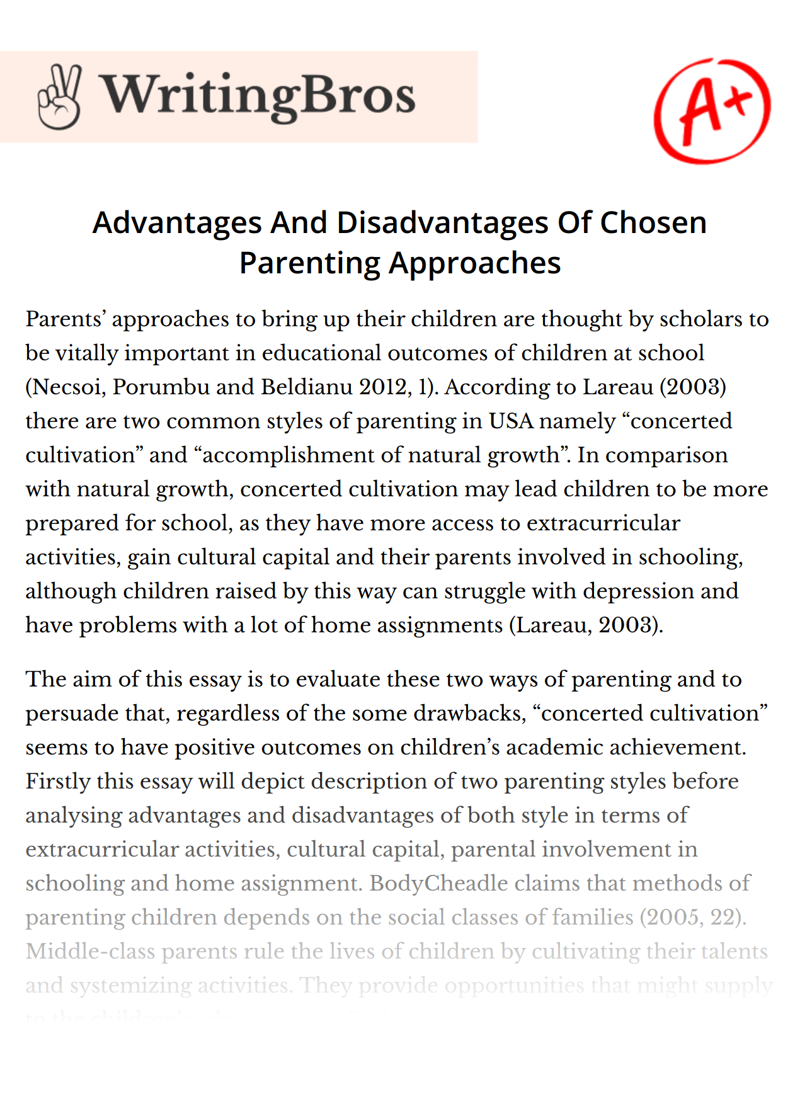Advantages And Disadvantages Of Chosen Parenting Approaches

Parents’ approaches to bring up their children are thought by scholars to be vitally important in educational outcomes of children at school (Necsoi, Porumbu and Beldianu 2012, 1). According to Lareau (2003) there are two common styles of parenting in USA namely “concerted cultivation” and “accomplishment of natural growth”. In comparison with natural growth, concerted cultivation may lead children to be more prepared for school, as they have more access to extracurricular activities, gain cultural capital and their parents involved in schooling, although children raised by this way can struggle with depression and have problems with a lot of home assignments (Lareau, 2003).
The aim of this essay is to evaluate these two ways of parenting and to persuade that, regardless of the some drawbacks, “concerted cultivation” seems to have positive outcomes on children’s academic achievement. Firstly this essay will depict description of two parenting styles before analysing advantages and disadvantages of both style in terms of extracurricular activities, cultural capital, parental involvement in schooling and home assignment. BodyCheadle claims that methods of parenting children depends on the social classes of families (2005, 22). Middle-class parents rule the lives of children by cultivating their talents and systemizing activities. They provide opportunities that might supply to the children’s advancement. Dialogue between adults and children is one of the most essential features of middle-class method of raising young. By stimulating children’s robust sense of entitlement, adults enroll in process of concerted cultivation.
Middle-class children gain abilities that may be beneficial for academic performance. However, working-class parents have different approach which purpose does not lie in bringing out children’s emotions, views and ideas. Financial limits make it primary parenthood responsibility of these parents to provide with food and house, to guide children to the doctor (mostly by bus) and to wash their apparel. Working-class parents do not recognize concerted development of children, specifically via arranging entertainment, vitally important part of good parenting. There are outer limit between adults and children in such family. The main trait of such parenthood is using directives without reasoning. Working-class children dominate their spare time activities and they are liberate to walk out and entertain with friends or relatives. This family class contributes the accomplishment of natural growth (Lareau, 2003).
These contrasts in parenting style influence children’s school life. Firstly, it is necessary to consider that owing to participating in extracurricular activities from a very young age, middle-class children acquire cognitive skills such as communicating with adults as comparative equals, verbal agility and negotiating to gain benefit, which assist the progress of their successful adaption into social institution in particularly school (Bodovski, 2007). Redford (2007, 32) suggests the view “...these activities teach kids how to perform “on-stage” and under pressure. In addition, children learn skills that will later be useful in white collar positions, such as making eye contact with others…”. Involvement in extracurricular activities teaches significance of discipline and deadlines, coping with other students and working in a group and responsibility (Fredricks 2002 quoted in Redford 2007, 31-32). Broh( 2002, 84). and Eccles (2003) found positive academic outcomes for all these extracurricular activities with regard to student GPA (Redford 2007,34).
According to Bourdieu (1983; 1973 quoted in Redford 2007,21) “...cultural capital is the possession and reproduction of cultural goods that is unique to specific social classes, which provides dispositions that are inherited from the family to the child…”. Larue (2003) reports that it contributes to benefit of middle-class children over poor-family children, for the reason that cultural capital assists students to attain academic knowledge. Furthermore, regarding students class they are concerned differently by teachers .Laure’s research illustrates that parents engaging in concerted cultivation actively participate in children’s education and interact with their teachers.
Fan and Chen (2001 quoted in Redford 2007, 27) established that parental participation and expectations has beneficial influence on academic success and grades of children, as it reduces problematic behavior.However, this parenting style is not without its disadvantages. Lareau (2003) claims that middle-class mothers by participating in school life of children’s depress them. Parents’ interventions, which appeared to be innocent, may make children feel discomforted and instead of inspiring can reduce their motivation to sweat at school. Moreover, overscheduling can create problems with big amount of home assignments. Children may not handle with it due to lack of free time.
Cite this Essay
To export a reference to this article please select a referencing style below

